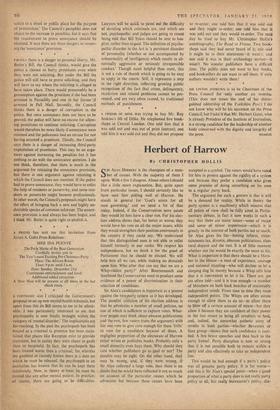A FORTNIGHT AGO I criticised the Government's proposal to set
up new mental health tribunals, but apart from this its Bill seems to me to be admir- able. I was particularly interested to see that psychopathy is now finally brought within the category of 'mental disorder.' The implications are far-reaching. In the past the psychopath has been treated as a criminal (a pretence has been main- tained that places like Rampton exist to provide treatment, but in reality they were closer to gaols than to hospitals). In fact, the psychopath has been treated worse than a criminal; for whereas the gaolbird in custody knows there is a date pn which he must be released, the psychopath in an institution has known that he can be kept there indefinitely. Now,' in theory at least, he must be treated like any other mental patient. In practice, of course, there are going to be difficulties. Lawyers will be quick to point out the difficulty of deciding which criminals are, and which are not, psychopaths; and judges are going to resent being told that Bill Sykes should be sent to hos- pital, rather than to gaol. The definition of psycho- pathic disorder in the Act is 'a persistent disorder of personality (whether or not accompanied by subnormality of intelligence) which results in ab- normally aggressive or seriously irresponsible conduct.' Though more helpful than most, this is not a rule of thumb which is going to be easy to apply in the courts. Still, it represents a step in the right direction, reflecting growing public recognition of the fact that crime, delinquency, recidivism and related problems cannot be pre- vented, and are very often caused, by traditional methods of punishment.










































 Previous page
Previous page